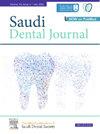Self-perceived cultural competence skills among graduating dental students in Saudi Arabia
IF 2.3
Q3 DENTISTRY, ORAL SURGERY & MEDICINE
引用次数: 0
Abstract
Objectives
Graduating culturally competent dentists is crucial for providing a high standard of care for patient outcomes and satisfaction. The objectives of this study were to assess the self-perceived cultural competence (CC) among graduating dental students and to explore factors that may influence the development of these competencies.
Methods
A cross-sectional survey design was employed, utilizing a self-administered electronic questionnaire. The survey was distributed to graduating dentists at the end of their internship year. The survey included demographic data, academic information, and self-rating of CC skills adapted from the Knowledge, Efficacy, and Practices Instrument rated on a 4-point Likert scale.
Results
Of 660 respondents, the majority (57.3%) were female, and most participants (87.7%) were raised in urban cities. Self-perceived CC was highest for treating patients of the same gender and lowest for patients with special needs. Bilingualism, gender, and school type were significant predictors of CC scores, with female dental providers, graduates of private or international high schools, and bilingual individuals performaing better in treating patients from diverse backgrounds. Clinical rotations in varied settings were reported by 93.2% of students to improve their CC skills.
Conclusions
The findings suggest that experiential exposure to service learning and diverse patient populations has a positive impact on dental students’ CC skills. Mastering a second language emerged as a key factor in CC development, with treating patients with special needs identified as an area for further curricular improvement.
沙特阿拉伯牙科毕业生自我认知的文化能力技能
培养有文化能力的牙医对于为患者提供高水平的护理结果和满意度至关重要。摘要本研究的目的是评估牙科毕业生的自我认知文化能力,并探讨影响这些能力发展的因素。方法采用横断面调查设计,采用自填式电子问卷。该调查在实习期结束时分发给即将毕业的牙医。该调查包括人口统计数据、学术信息,以及采用李克特4分制的知识、功效和实践工具对CC技能的自评。结果660名受访者中,大多数(57.3%)为女性,大多数(87.7%)在城市长大。自我认知的CC在治疗同性别患者中最高,在治疗有特殊需要的患者中最低。双语能力、性别和学校类型是CC分数的显著预测因子,女性牙科医生、私立或国际高中毕业生和双语个体在治疗不同背景的患者时表现更好。93.2%的学生报告了在不同环境下的临床轮转,以提高他们的CC技能。结论体验式服务学习和不同患者群体对牙科学生的CC技能有积极影响。掌握第二语言成为CC发展的关键因素,治疗有特殊需要的患者被确定为进一步改善课程的领域。
本文章由计算机程序翻译,如有差异,请以英文原文为准。
求助全文
约1分钟内获得全文
求助全文
来源期刊

Saudi Dental Journal
DENTISTRY, ORAL SURGERY & MEDICINE-
CiteScore
3.60
自引率
0.00%
发文量
86
审稿时长
22 weeks
期刊介绍:
Saudi Dental Journal is an English language, peer-reviewed scholarly publication in the area of dentistry. Saudi Dental Journal publishes original research and reviews on, but not limited to: • dental disease • clinical trials • dental equipment • new and experimental techniques • epidemiology and oral health • restorative dentistry • periodontology • endodontology • prosthodontics • paediatric dentistry • orthodontics and dental education Saudi Dental Journal is the official publication of the Saudi Dental Society and is published by King Saud University in collaboration with Elsevier and is edited by an international group of eminent researchers.
 求助内容:
求助内容: 应助结果提醒方式:
应助结果提醒方式:


